Defending Rights in a “No Rights Zone”: Annual Report on the Situation of Human Rights Defenders in China (2018)
Comments Off on Defending Rights in a “No Rights Zone”: Annual Report on the Situation of Human Rights Defenders in China (2018)Introduction
Chapter 1: Relentless Persecution of Human Rights Defenders
1.1 Arbitrary Detention
1.2 Enforced Disappearances
1.3 Torture and other Cruel, Inhumane, or Degrading Treatment
1.4 Reprisals for Engaging with the International Human Rights System
Chapter 2: Deteriorating Conditions for Defending Human Rights
2.1 Freedom of Expression
2.2 Freedom of Association & Peaceful Assembly
2.3 Religious Freedom
2.4 Mass Detention of Muslims in Ethnic Uyghur Region
2. 5 Pervasive State Surveillance
Chapter 3: Human Rights Defenders: Risks & Resilience
3.1 Human Rights Lawyers
3.2 Labor Rights Defenders
3.3 Women’s Rights and LGBTQ Defenders
Recommendations
Introduction
In 2018, human rights defenders in China made strides in promoting and protecting human rights under hostile conditions in drastically shrunken civic space. The government under President Xi Jinping escalated brutal suppression of rights activists, lawyers, critics of authoritarian rule, repressed religious communities, and ethnic minorities, especially in the Tibetan and Uyghur regions.
Xi Jinping, the President of China and the Chinese Communist Party (CCP) General Secretary, continued to hold all the power in his own hands and tightened CCP control over the government, the legislation, the judiciary, the press, religious practices, academia, and other sectors of society.
Under Xi, China’s authoritarian one-party political system has become the most draconian and invasive since the 1980s. The system denies Chinese citizens their human rights to democratic participation, freedom of expression, association, peaceful assembly, and freedom of religion, and it punishes them for promoting and exercising these rights. In 2018, authorities continued to block citizens’ efforts to voice their grievances, including criticizing the government’s failure to protect economic, social and cultural rights, or to seek redress for those grievances.
In international forums, including at the United Nations (UN), the Chinese government has aggressively promoted “human rights with Chinese characteristics,” which emphasizes development without protections for universal human rights and freedoms, as a model for other countries and the global system. As a member on the UN Security Council and Human Rights Council, the Chinese government has acted defiantly, contrary to its obligation to uphold universal human rights, and instead intensified its attack on principles enshrined in the Universal Declaration of Human Rights and in the human rights treaties that China signed or ratified.
The Chinese government fought fiercely to deny reports of internment camps in the Xinjiang Uyghur Autonomous Region and rejected critical recommendations by the UN Committee on the Elimination of Racial Discrimination (CERD), which reviewed China’s compliance in August, and by other state parties during the Universal Periodic Review in November. The government continued to enjoy impunity for its violations of practically every article in the UN General Assembly’s Declaration on Human Rights Defenders.
2018 was another year of harsh reprisals against human rights defenders (HRDs) by Chinese authorities for their peaceful exercise of and advocacy for human rights. Types of retaliation included the use of torture, enforced disappearance, and arbitrary detention. The government threatened and blocked defenders from attending human rights trainings and persecuted them for having cooperated or seeking to cooperate with UN human rights experts.
Despite the tremendous obstacles and risks, human rights defenders in China carried on their efforts to amplify the voices of victims from marginalized and persecuted communities, document violations, endeavour to hold the perpetrators accountable, provide assistance, and advocate for policy or systemic reforms. HRDs demonstrated remarkable resilience, resourcefulness, and strength in taking actions to disclose government failures to protect labor, education, housing, health, food safety and environmental rights, and expose authorities’ brutal suppression of rights defenders, faith communities, and ethnic minorities. These defenders bore the brunt of government retaliation.
CHRD urges the Chinese government to respect human rights and fundamental freedoms and end its repression of civil society, including HRDs. The government must release all detained and imprisoned human rights defenders including rights lawyers; investigate allegations of torture and hold torturers criminally responsible; provide detainees and prisoners prompt access to proper medical treatment; repeal “residential surveillance at a designated location” (RSDL) and end the practice of enforced disappearance; stop reprisals against HRDs for cooperating with UN human rights operations; protect the rights to freedom of expression, assembly, association, and religious freedom; and end mass arbitrary detention of ethnic Uyghurs and other Turkic Muslims.
Chapter 1: Relentless Persecution of Human Rights Defenders
The government of China continued to target and harshly persecute HRDs in 2018. Authorities relied on existing laws and regulations, or adopted new ones, to justify arbitrary detention, forced disappearance, and torture of HRDs, or simply operated outside the law.
1.1 Arbitrary Detention
By the end of 2018, an estimated 879 HRDs were in pre-trial detention, forcibly disappeared, or prison according to data compiled by the China-based NGO Rights Defense Network (RDN). Of the total, 334 were awaiting trial or forcibly disappeared, and 545 were convicted and sentenced to prison. CHRD has documented many of these cases including detailed information about the HRDs’ human rights activities. (This data does not include the hundreds of thousands ethnic Uyghurs and Turkic Muslims held in Xinjiang. See Section 2.4: Mass Detention of Muslims in Ethnic Uyghur Region).
The detentions of HRDs in these cases are arbitrary by international standards. In China, detention is often used to punish activists, lawyers, and citizen journalists for exercising and/or defending human rights. These cases have almost always involved deprivation or curtailment of due process rights protected by international law as well as rights under Chinese law.
The arbitrariness of the detentions to which authorities subjected HRDs is illustrated by the police crackdown on the members of a WeChat group called “National Tourism Chat Group.” The group had a simple objective, to support detained HRDs and their families by collecting donations online and delivering the funds to them. In June, police summoned dozens of members for questioning, detained eight, and eventually formally arrested two: the founder Guo Qingjun (郭庆军) and Sun Wenke (孙文科). A Jiangxi court put Guo on trial on charges of “picking quarrels and provoking trouble” in early February 2019.
In January, the CCP’s Central Committee and the State Council announced a crackdown on so-called “criminal and evil forces.” A notice that began circulating in February listed 12 key targets of the crackdown including those who “threaten political security” and those who are “behind-the-scenes organizers and operators,” who “incite” petitioners to “illegally petition.” This directive provided justification for targeting HRDs, who have sometimes been accused of such actions, for criminal prosecution.
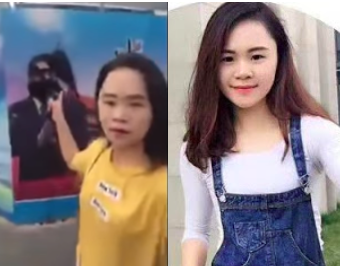
Involuntary psychiatric commitment, a perverse system of extrajudicial detention, has persisted. Authorities often used this system to silence and punish government critics and rights defenders in 2018. China’s Mental Health Law (2013) bans committing an individual to psychiatric institutions without the family’s consent or two doctors’ diagnoses, but the law left numerous loopholes for abuse, such as allowing for involuntary commitment if the guardians can’t be located. The NGO Civil Rights and Livelihood Watch has documented hundreds of cases including many individuals who remained locked up in psychiatric institutions in 2018. In one case, in July, authorities in Hunan locked up Dong Yaoqiong (董瑶琼) in a psychiatric institution after she live-streamed a video of herself splashing ink on a poster in Shanghai of President Xi in a protest against despotic rule and tyranny. Authorities forcibly disappeared her father after he spoke out about the case. She was believed to still be held in the psychiatric institution at the end of 2018, according to her father.
UN human rights treaty bodies have repeatedly criticized China’s psychiatric detention as a form of arbitrary detention. Yet, the practice continued. China’s Supreme People’s Procuratorate (SPP) released “Provisions on the Supervision by the People’s Procuratorate of Compulsory Medical Treatment” in February 2018 to further standardize supervision of such treatment in psychiatric hospitals, but the regulations are unlikely to end abuses of HRDs detained in such institutions. The SPP noted that the regulations are intended for cases involving those who “faked” mental illness to evade criminal prosecution or ordinary citizens that were mistakenly committed.
1.2 Enforced Disappearances
In 2018, police increasingly relied on a form of legalized enforced disappearance to punish and silence rights activists, lawyers, and dissidents. Article 75 of China’s Criminal Procedure Law (2018, previously Article 73 in 2012 CPL) is the legal provision justifying “residential surveillance in a designated location” (RSDL). RSDL allows police to hold detainees, suspected of endangering national security, in secret locations and deny them any visit or contact with their lawyers and families, leaving the detainees at high risk of being tortured. Families may be notified of the RSDL status but not the location of their loved one.
Several HRDs were subjected to enforced disappearance under RSDL in 2018. Among them are lawyer Yu Wensheng (余文生) and activists Huang Xiaomin (黄晓敏), Li Xiaolong (季孝龙), Xu Qin (徐秦), Zhen Jianghua (甄江华), and Zhu Chengzhi (朱承志). Police disappeared many labor activists and student supporters into RSDL following their detention for participating in actions supporting a labor strike in Shenzhen in the summer (See Section 3.2: Labor Rights Defenders).
In August, multiple UN Special Procedures issued a joint letter urging the Chinese government to “repeal the 2012 CPL provisions that instituted the use of RSDL” because it contradicts a number of China’s international human rights obligations and commitments. Previously, the Committee against Torture in its Concluding Observations expressed concern about RSDL and called on China as a matter of urgency to repeal the provisions in the Criminal Procedure Law that allow individuals “to be held de facto incommunicado.”
Despite this intervention, the government continued to target HRDs with enforced disappearances. In December, during a crackdown on an independent Christian church (see Section 2.3: Religious Freedom), Chengdu authorities put the wife of the church’s detained pastor under RSDL on “inciting subversion” charges.
In a move that further legalized forced disappearance, in March, China’s rubber stamp parliament approved the creation of the “National Supervisory Commission” (liuzhi), a system which would allow for the enforced disappearance of CCP or government officials for up to six months for “investigation” of corruption or other accused crimes.
In May, Chongqing police put under secret detention environmentalist Xue Renyi (薛仁义) on unknown charges after he took part in protests on International Labor Day. Police targeted Xue because he led an advocacy group that campaigned for universal healthcare, social security, environmental protection, and food safety. His family was not informed of his whereabouts until January 2019, when officials confirmed he was being held at Chongqing Dianjiang Detention Center.
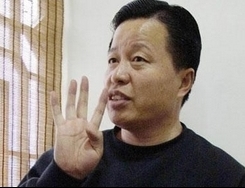
In a particularly egregious case, rights lawyer Gao Zhisheng (高智晟) has been missing since August 2017, after being held in secret and tortured many times in the past. Gao’s lawyers and family have demanded authorities disclose his whereabouts without any success. In July, authorities finally released Liu Xia (刘霞), the poet and artist, and allowed her to leave China for Germany. She had been under illegal house arrest since October 2010, right after her husband Liu Xiaobo (刘晓波) was awarded the Nobel Peace Prize. After Liu Xiaobo died in custody in July 2017, authorities repeatedly disappeared Liu Xia, despite her fragile health. Her whereabouts were unknown until her unexpected release.
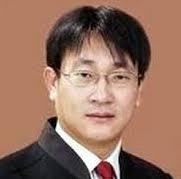
In December 2018, Tianjin authorities finally put lawyer Wang Quanzhang on trial after he had spent nearly 3.5 years in incommunicado detention, of which six months was spent under enforced disappearance in RSDL. Authorities conducted the trial of Wang behind closed doors and handed down a 4.5-year sentence at the end of January 2019. Wang reportedly dismissed his officially-appointed lawyers during the trial and his wife was banned from attending. At the time of this report’s release, none of Wang’s family members or friends and supporters have had any contact with him.
Legalized enforced or involuntary disappearance in China ensnared individuals far beyond the circles of HRDs in 2018. Among those subjected to this form of punishment were a prominent film star, the head of Interpol, a US permanent resident photographer, and two Canadians.
1.3 Torture and other Cruel, Inhumane, or Degrading Treatment
There was no significant reform or revision of legal provisions in Chinese law to effectively prohibit or prevent torture. Legal loopholes, perverse incentives, and poor or selective law enforcement meant that torture remained rampant in police stations and incarceration facilities in 2018.
In October, China’s legislative body adopted amendments to the CPL that further undermined protections against torture. The amendments legally enshrined the practice of allowing courts to hand down reduced sentences if the defendants confess to the crimes as charged, which effectively encourages the use of torture during police interrogations to coerce confessions.
Reports in 2018 shed light on torture in detention centers and internment camps in Xinjiang. Uyghur woman Mihrigul Tursun testified to the US Congress that she had been physically and psychologically tortured from 2015-2018. She described being deprived of access to her newborn infants, one who later died as a result of medical complications, deprived of sleep, interrogated non-stop, forcibly committed to a psychiatric institution, stripped naked and strip searched, deprived of fresh air, food, shower facilities, and held in an overcrowded cell. She testified that she witnessed the deaths of 9 women in the camp. There have been several other reports of deaths in internment camps in Xinjiang.
HRDs that have been held in detention facilities described overcrowded cells, bad sanitation, and humiliating living conditions. One detailed account of ill-treatment at Panyu District Detention Center in Guangzhou was provided by a student activist, Sun Tingting (孙婷婷), after her release in January 2018.
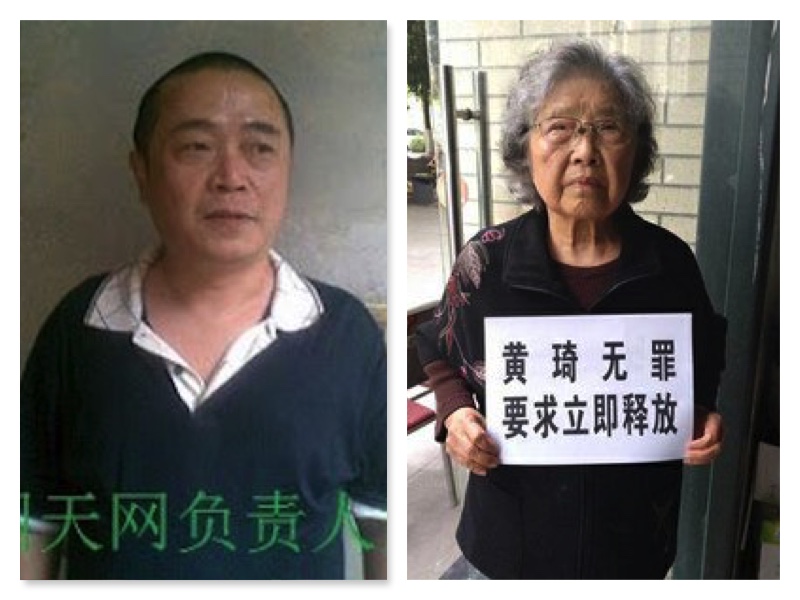
Authorities continued to use deprivation of medical treatment to punish detained or imprisoned rights defenders suffering from serious illnesses. Detained activist Huang Qi (黄琦)’s health declined as authorities refused to release him or provide him with adequate medical treatment for life-threatening liver and heart diseases and fluid in the brain. Huang’s mother petitioned authorities for his release and as a result, police detained her in a secret location for over a month, only releasing her after Huang was put on trial. Huang Qi’s deteriorating health raised alarm. 14 human rights NGOs and 4 UN independent human rights experts issued separate statements at the end of 2018 calling for Huang’s release over concerns he could die in detention.
Deprivation of medical care also resulted in the worsening health conditions of Hu Shigen (胡石根) in prison. Hu has heart and liver disease and hypertension, and has been hospitalized multiple times while imprisoned in Tianjin, where he is serving a 7.5-year sentence. 10 prisoners of conscience, including Huang Qi and Hu Shigen, remain on CHRD’s medical watch list.
Detention center officials continued to force detainees to take unknown “medication” or drugs, possibly as punishment or as part of efforts to coerce them into confessing or providing information against their will. Imprisoned lawyer Jiang Tianyong (江天勇) told his family during a May 2018 visit that he had been forced to take an unknown medication and that his memory appeared to have rapidly deteriorated as a result. Several allegations made in 2017 by released lawyers and activists, who were detained during the “709 Crackdown,” included that they had been forced to take unknown medications, which caused memory loss, confusion, and other conditions.
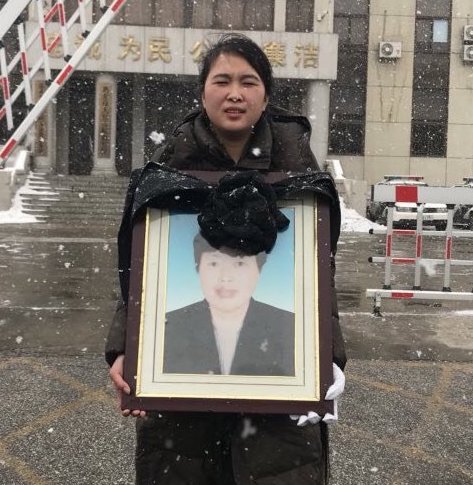
In December, 7 Shandong officials received light prison sentences over the death in detention in 2009 of petitioner Li Shulian (李淑莲), who was killed while held under their custody in an extralegal “black jail” in Longkou City. The pressure to hold a trial and bring some small measure of redress is largely down to the perseverance of Li’s daughter, Li Ning, who spent the past decade petitioning for justice for her mother. Authorities prevented Li Ning from attending December’s hearing, which followed a September trial, both of which were held behind closed doors on the grounds the case involved “state secrets.”
1.4 Reprisals for Engaging with the International Human Rights System
The Chinese government has become ever more emboldened in retaliating against HRDs for their work upholding international standards and cooperating with the UN human rights mechanisms. Following the March 2014 death in custody of activist Cao Shunli, who had sought to participate in China’s 2nd Universal Periodic Review process, the lack of any meaningful sanctions from the UN or States against such a blatant act of lethal reprisal sent a signal to the Chinese government that it could continue retaliating against HRDs with virtual impunity.

The UN Secretary-General’s 2018 reprisal report listed 4 new cases of government reprisals against HRDs: lawyer Wang Yu, activist Mi Chongbiao (糜崇标) and his wife Li Kezhen (李克珍), and activist Qin Yongmin (秦永敏). These 4 individuals had been subjected to punishment by the Chinese government for seeking to cooperate or having cooperated with the UN, its representatives and human rights mechanisms. The Secretary-General (SG)’s report also followed up on the case of Jiang Tianyong, included in the SG’s 2017 report, noting the government’s failure to address the issue of reprisals against Jiang, who remained imprisoned in 2018.
During and around the review in August of China by the UN Committee on the Elimination of Racial Discrimination (CERD), and prior to the 3rd Universal Periodic Review of China at the Human Rights Council in November, the Chinese government also intensified its campaign of intimidation and attempts to discredit international human rights NGOs, media, and UN independent experts for exposing and criticizing China’s abuses of human rights, especially its internment camps of the Uygur and other Turkic Muslim ethnic minorities in Xinjiang. Authorities continued to harass and smear international NGOs for cooperating with the UN. Throughout the year, CHRD was the target of anonymous emails, believed to be sent by Chinese state security agents. These emails threatened our staff with physical assault and abduction if the organization held its planned trainings on UN human rights mechanisms. CHRD had submitted reports to CERD and the UPR to highlight issues of concern and challenge contents of the government’s own reports.
The October amendments to China’s Criminal Procedure Law could be used to threaten and punish HRDs outside China for advocating for human rights and criticizing the Chinese government’s abuses. Under the revised CPL, Chinese courts can put anybody in any part of the world on trial in absentia on charges involving bribery or the extremely overbroad accusation of “severely endangering national security.” The accused could be convicted without being able to mount a defence. The threat of a criminal conviction and the potential abuse of international arrest warrants, like Interpol’s, may cast a chilling effect on HRDs who risk being arrested outside China.
Chapter 2: Deteriorating Conditions for Defending Human Rights
In 2018, Chinese authorities appeared even more determined not to protect the basic rights and freedoms—freedom of expression, freedom of peaceful assembly and freedom of association—necessary for HRDs to carry out their work in promoting and protecting human rights. The failure to protect these rights, a severe crackdown on freedom of religion, mass arbitrary detention of ethnic Uyghurs and Turkic Muslims in Xinjiang, and the pervasive use of technology-based surveillance all contributed to an overall worsening human rights situation in China that posed severe risks and tremendous challenges for HRDs.
2.1 Freedom of Expression
In 2018, authorities further restricted freedom of expression online and offline through new laws and regulations and selective law enforcement targeting dissenting and critical opinions. Despite the threats and risks, however, HRDs continued to amplify the voices of victims of rights abuses.
Space for independent media content continued to shrink while the CCP expanded its propaganda apparatus. In March, the government created a new broadcasting service “Voice of China” by merging major state-television and radio channels. The new broadcaster will be directed by the CCP’s central propaganda bureau and operate as one of the largest propaganda outlets in the world. In September, the National Radio and Television Administration introduced “Imported Overseas Television and Radio Program Broadcasting Management Regulations (draft for comments).” Under the draft regulations, China would ban all foreign news and current affairs programs, and would require pre-approval from State Council regulators for the broadcast of any type of foreign content during primetime (19:00-22:00).
The government further expanded online censorship. In April, authorities forced China’s popular news portal, Jinri Toutiao, to remove an app called “Neihan Duanzi,” which had roughly 30 million users, over so-called “vulgar” content. The app was quickly deleted without any appeal process. During 2018, thousands of “self-media” social media accounts (individual accounts which publish original news content but are not registered with the government) were deleted upon the direction of the Cyberspace Administration of China (CAC) on the ground they spread “politically harmful information” or “vulgar” content. By December, 110,000 accounts had been deleted and 496,000 posts removed, according to CAC.
Authorities criminalized netizens who acted as administrators for social media platforms over online content officials found objectionable, even though the netizens were not the authors of the posts on those platforms, after authorities began to implement amendments to the Criminal Law (CL) and regulations issued by CAC. Luzhou City Court put a Sichuan netizen on trial for failing to delete “politically destructive” posts with 2012 dates from a website forum he managed. He was charged under a new crime introduced in 2015 amendments to the CL, in the first known instance of these amendments being enforced. In October, the administrator of a WeChat group received a six-month prison sentence for pornographic materials other posters shared in the group, after CAC introduced regulations in 2017.
Around politically sensitive dates of anniversaries or events, authorities ratcheted up draconian efforts around the country to prevent citizens from gathering, such as memorializing June Fourth victims and marking the 29th anniversary of the Tiananmen Massacre. Police detained, held in de-facto house arrest or RSDL, forced individuals to travel with them, or used other forms of harassment and intimidation to prevent people from assembling together.
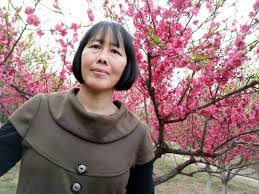
Authorities took strong measures against HRDs that criticised President Xi Jinping after one of the most sensitive political events of 2018—the abolition of presidential term limits and the addition of “Xi Jinping Thought” to China’s constitution during the March legislative session. A Beijing court convicted activists Ding Lingjie (丁灵杰), Li Xuehui (李学惠), and Wang Fengxian (王凤仙) for “picking quarrels and provoking trouble” in December over a video mocking Xi Jinping, which authorities claimed “insulted a State leader.” Sichuan authorities put professor Zi Su (子肃) on secret trial on charges of “subversion of state power” in December. Zi Su had published an open letter calling for democratic elections of CCP leadership at the 19th Party Congress and for Xi Jinping to step down as head of the CCP.
In 2018, there were several noteworthy cases involving persecution of free expression. In December, a court in Jiangsu sent citizen journalist Sun Lin (孙林) to prison on a 4-year sentence for “inciting subversion of state power.” Sun stood trial in February. Initially detained in 2016, Sun was convicted for allegedly sharing posts on social media with content the government considered “politically sensitive.” In August, Shandong police burst into the home of retired professor Sun Wenguang to stop a live interview he was giving to Voice of America, and then briefly disappeared him. In the interview, the professor criticised Xi Jinping’s policies on spending money overseas in the “Belt and Road Initiative” instead of financing remedies to address pressing needs affecting the lives of people in China.
Other cases demonstrated continued government intolerance of dissent, including artistic expression. In July, political cartoonist Jiang Yefei (姜野飞) received a 6.5 year prison term after he was repatriated to China in 2015 from Thailand. Thai authorities sent him back to China even though he had received political refugee status from the UN High Commissioner for Refugees. The court convicted him for “subversion.” In December, Xu Lin (徐琳), a songwriter and activist, received a 3-year prison sentence. He had been detained around the 19th Party Congress for releasing songs expressing dissent or were dedicated to Liu Xiaobo. In 2018, Chengdu authorities continued to detain without trial four men—Chen Bing (陈兵), Fu Hailu (符海陆), Luo Fuyu (罗富誉), Zhang Junyong (张隽勇)—who have been detained since 2016 for producing and sharing images online of a Chinese liquor label commemorating the Tiananmen Massacre.
2018 also saw intensified government assault on academic freedom. Several professors lost their jobs for online posts or classroom comments perceived by authorities as critical of the government or the political system. Guizhou University dismissed professor Yang Shaozheng (杨邵政) in November after he posted online an article in 2017 critical of the CCP. In June, economics professor You Shengdong (优盛东) lost his job at Xiamen University after students reported his comments to authorities, who deemed them “politically inappropriate.” State-media reported in November that Chongqing’s 2019 university entrance exam will require students to be politically evaluated. Education officials later tried to back track after an outcry, by claiming that officials had reviewed students’ political ideology in college admission decisions for years. In a move likely to lead to further academic censorship, the Ministry of Education announced in September that it would begin a nationwide inspection of textbooks, claiming that in some regions education authorities had altered or used non-standard texts.
In Xinjiang, the government rounded up and persecuted hundreds of ethnic Uyghur intellectuals with advanced professional qualifications in the ongoing crackdown affecting millions of ethnic minority residents in the region. An estimated 231 scholars have been subjected to enforced disappearance and arbitrary detention in internment camps by the end of 2018, including some who have reportedly been tortured and died. The detention of Uyghur intellectuals contradicted the Chinese government’s claim that the internment camps were “vocational training centers.”
In Tibet, expressing political or religious dissent continued to be punished with heavy prison sentences on charges of “inciting separatism.” The government sentenced activist Tsegon Gyal to a 3-year jail term in February, punishing him for comments he wrote on WeChat. Tashi Wangchuk received a 5-year prison sentence, handed down by a Qinghai court in May, for calling for the preservation of Tibetan language and culture. The UN Working Group on Arbitrary Detention had declared in two opinions in 2017 that they were arbitrarily detained and must be released and provided with state compensation.
2.2 Freedom of Association & Peaceful Assembly
The space for individuals to join or form rights-based NGOs and other social groups to exercise their right to freedom of association continued to shrink in 2018. The Chinese government has enforced the draconian Overseas NGO Law and criminally prosecuted NGO leaders since late 2016. Those who took to the streets or any public space to express dissent or advocate for human rights, rule of law, or government accountability have faced detention and criminal prosecution.
Authorities continued to restrict the space for independent NGOs to operate in China. In March, China’s civil affairs and public security ministries announced a joint operation to shut down so-called “illegal organizations.” According to the ministries, they had closed down 300 such organizations since the end of 2017. By August 2018, authorities had sanctioned 1,800 organisations, and in January 2019 that number jumped to 5,845. A Hong Kong LGBT NGO worker was administratively detained and banned from entering mainland China in January 2019, which was the first-known instance of an overseas NGO worker being detained under the law since it took effect on January 1, 2017.
The Ministry of Civil Affairs released revised draft Regulation for the Registration and Management of Social Groups in August, which would replace three other regulations that had been in use for managing domestic social groups. The proposed regulation would require NGOs to establish a Communist Party cell inside the organisation to carry out CCP directives and monitor compliance (Article 7). In enacting the National Intelligence Law, which was passed in 2017 with provisions that could be used to penalize communication or relationships with overseas NGOs or foreigners, the Ministry of National Security opened an Internet platform in April for citizens to report on each other for suspected “endangering national security” criminal activities or espionage, with the potential of a reward.
Meanwhile, Chinese authorities continued to use criminal prosecution to persecute HRDs for exercising the right to freedom of association. In particular, authorities targeted independent Chinese rights advocacy groups that monitored and reported on rights abuses. Three leaders of such organizations were put on trial on “endangering state security” charges in 2018.
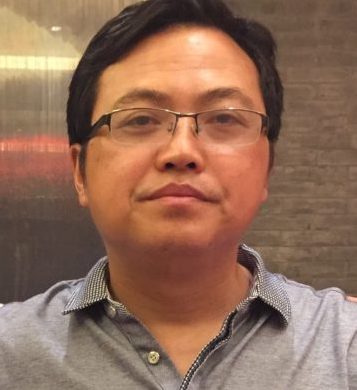
A Hubei court put Liu Feiyue (刘飞跃), head of the online website Civil Rights and Livelihood Watch, on trial in August on charges of “inciting subversion.” The court sentenced Liu to 5 years’ imprisonment in January 2019, and the verdict indicated he was punished largely because of his activities running the website and publishing human rights reports. The court also cited the acceptance of foreign funding as “evidence” of inciting subversion, and handed down an approximately 1 million RMB (150,000 USD) fine, roughly equivalent to the funding authorities believed the group had received over several years.

In August, a court in Guangdong held a secret trial of HRD Zhen Jianghua (甄江华), director of Human Rights Campaign in China, also on charges of “inciting subversion.” Zhen received a two-year sentence in a closed-door hearing in December. The entire proceedings were held in secret, and authorities never allowed Zhen access to his family-hired lawyer.
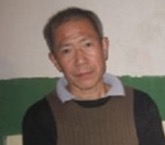
A Hubei court sentenced activist Qin Yongmin to 13 years in prison in July for “subversion of state power.” The verdict cited Qin’s writings and advocacy promoting democracy and defending human rights. This included his leadership role with Human Rights Watch in China (HRWIC, or the “Rose Team”), a group he had founded. Xu Qin (徐秦), who became the Rose Team’s main spokesperson after police seized Qin Yongmin in 2015. Police detained her from February to September 2018. She was released on bail but remains under tight police surveillance.
Throughout 2018, Huang Qi, director of 64 Tianwang Human Rights Center, remained in pre-trial detention. Prosecutors added an additional charge of “intentionally leaking state secrets” in October 2018, which meant that he might face a heavier prison sentence. Police forced his 85-year-old mother, Pu Wenqing (蒲文清), into involuntary disappearance in December after she went to Beijing to seek her son’s release. Jiang Chengfen (姜成芬), a 64 Tianwang affiliated citizen journalist, received a 30-month sentence in June, for “picking quarrels and provoking trouble.”
In April, the UN Working Group on Arbitrary Detention issued an Opinion determining Huang Qi and Liu Feiyue’s detentions were arbitrary and urged the government to immediately release them both.
The UN Committee on the Elimination of Racial Discrimination called on China in its concluding observations to “provide an open space for civil society, and specifically for non-governmental organizations working to combat racial discrimination.” Several China-based NGOs working in these western areas have been forced to close for political reasons or have been cut off from funding until they were forced to shut down.
Exercising the right to peaceful assembly remained a criminal offense in China. Though the right to peacefully protest is written into the Chinese Constitution, police have systematically rejected applications to hold demonstrations and have broken up spontaneous rallies. Provisions set out in the Law on Assemblies (1989) requires citizens to obtain a permit from the police and prohibits demonstrations that challenge the CCP or criticize government policies.
As in past years, authorities continued to resort to criminal detention to shut down peaceful assemblies and gatherings. Police raided private homes to break up small gatherings, detained workers, teachers, army veterans, bank clerks, parents with children sickened by faulty vaccines, or anyone outside government buildings trying to lodge grievances. Fujian authorities put 11 activists on trial in January and sentenced them later on charges of “picking quarrels and provoking trouble.” The group’s activities included gathering at a private setting to discuss democracy, commemorating June Fourth in a public space, and protesting weekly outside the Fujian Province Higher People’s Court. In Shaanxi, activist Jiang Yarong (蒋亚绒) received a 4.5-year prison sentence in February, for “picking quarrels and provoking trouble,” after she staged a protest against labor abuses at a company where she had worked.
On International Labor Day, May 1, police in many cities rounded up dozens of people suspected of responding to online calls for a nationwide demonstration for better human rights protections. In late April, crane operators in 30 cities across 19 provinces went on strike, demanding workplace safety protections and higher pay. Police swiftly detained some workers, interrogated them, and intimidated others, while censors deleted online posts to prevent a May Day national strike.
In May, Sichuan police disrupted a gathering of Chengdu residents, who had met to remember those who perished 10 years ago in the Wenchuan Earthquake, and briefly detained about 100 members of the Chengdu Early Rain Covenant Church. The church subsequently became the target of a major crackdown in December (See Section 2.3: Religious Freedom).
2.3 Religious Freedom
Under Xi Jinping’s policy to “sinicize” religion, authorities severely curtailed freedom of religion in China in 2018. The government introduced new regulations and rules to restrict religious practice, strengthened government intrusion, and restricted communication with overseas religious groups. When revisions were made to the constitution during the March legislative session, the CPP-controlled body the United Front Organization absorbed the State Administration for Religious Affairs (SARA), putting the management of religion directly under the CCP. Despite the deterioration in religious freedom, the Vatican signed a provisional agreement with the Chinese government in September.
In February, the revised Regulations on Religious Affairs came into effect. The revised regulations strengthened government control in nearly every aspect of religious affairs, including religious activities, venues, personnel, and church assets. The regulations explicitly linked religious practice to national security and terrorist threats. They stipulated as “unlawful” such activities as accepting foreign or domestic donations, “advocating, supporting, or funding religious extremism,” (the definition of “extremism” was left vague and overly broad and authorities have described as “extremist” the basic tenets of Islam), organizing or presiding over unapproved religious activities, or travelling overseas for a religious activity without government approval (Articles 69-73).
In May, the SARA introduced new draft Foreigners Collective Religious Activities Management Measures for overseas church groups to register to hold religious activities in China. These regulations would effectively prohibit Chinese citizens and foreigners living in China from attending the same religious gatherings. In September, the SARA also introduced the draft Internet Religious Information Services Management Measures, which defined “Internet religious information” as religious teachings disseminated through texts, pictures, audio, video, the Internet, apps, blogs, etc. Under these draft measures, individuals and organizations would need to register “religious information” with the government and overseas groups would be prohibited from registering and sharing such content.
Following the newly amended Regulations on Religious Affairs, the government stepped up pressure to shut down Christian house churches. Officials required intrusive video surveillance equipment be installed in churches and church goers’ information be handed over. The government banned bible sales online, demolished church buildings, and disrupted religious practices of Christian communities in many cities and provinces. In September, police and government officials raided and damaged four separate house churches in Henan in coordinated operations, and dragged away church members who tried to protect church property. Some church members also received administrative detentions for criticising the raids online. The same month, Beijing officials forced Beijing Zion Church, reportedly Beijing’s largest independent Christian church, to shut down on the grounds that it had not registered with the government.
In response to these suppressive measures, in early September, over 100 pastors published an open statement criticizing the amended Regulations on Religious Affairs. The statement garnered hundreds of signatures across China. The church leaders vowed to remain independent, refused to join state-controlled official churches, and stood their ground by not registering their house churches with the government.
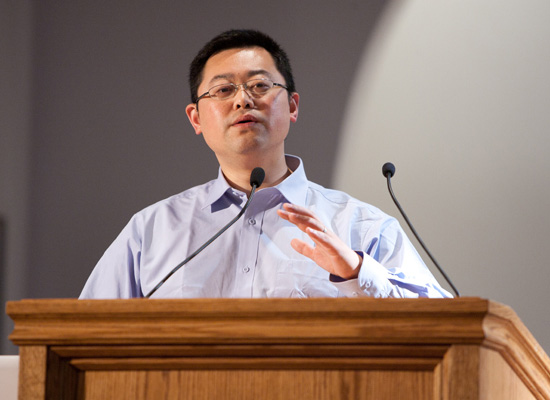
Months after the open statement was made public, Chengdu authorities raided the Early Rain Covenant Church in December and detained its outspoken pastor Wang Yi (王怡). Police took hundreds of church members into custody, before eventually criminally detaining at least 20, putting a dozen under administrative detention, and reportedly holding approximately 50 in a “Legal Education Center” in an undisclosed location. Wang Yi and his wife, Jiang Rong (蒋蓉), who has been forcibly disappeared in RSDL, are both being held on suspicion of “inciting subversion of state power.”
There have been increased restrictions on Hui Muslims in other regions, including in the Ningxia Hui Autonomous Region and in Gansu Province. Authorities have targeted halal products, linking halal with religious extremism, and claiming pan-halal products were part of a “suspected trend of Islamic rituals penetrating into secular life.” In March, authorities in Gansu shut down 760 shops that sold pan-halal products and Ningxia authorities forced restaurants and shops to remove halal lettering in the Arabic script. Gansu authorities abolished four identification standards for halal food in December, saying it would “curb religious extremism.” State media reported that the provinces of Ningxia, Qinghai, Shaanxi, Henan, Yunnan and Tianjin Municipality will also abolish their halal identification standards. In August, authorities in Wuzhoung City announced plans to demolish the Weizhou Grand Mosque over suspected permit violations, leading to protests. Foreign journalists reporting on increased restrictions on religion in Ningxia have reportedly being driven out of the region by police.
2.4 Mass Detention of Muslims in Ethnic Uyghur Region
In 2018, the outside world became more aware of the scale of mass detention of Uygurs and other Turkic Muslims, as part of the Chinese government’s “counter-terrorism and counter-extremism” policies in the Xinjiang Uyghur Autonomous Region. The government adopted legislation and policy to “make religion more Chinese,” namely, controlled by the CCP. Authorities detained up to 1 million Uyghur Muslims without judicial review in “massive internment camps shrouded in secrecy,” and up to 2 million in forced political indoctrination sessions. In numbers far beyond the country’s average rate, ethnic Uyghurs were criminally arrested and indicted. Authorities forced detainees to denounce their faith and pledge loyalty to the Chinese Communist Party and the Chinese state.
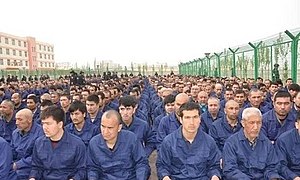
Following scrutiny by the UN CERD during its August review of China, the government defended the camps as vocational training centers. In October, the Xinjiang regional government revised regional regulations on counter-terrorism and counter-extremism to give some legal basis for the extra-legal “re-education” camps. Revisions to the Xinjiang De-Extremism Regulations and Xinjiang Implementing Measures for the Counter-Terrorism Law, released on October 9 and enacted immediately, tried to provide some legitimacy to the use of “vocational skill and education training centers” (职业技能教育培训中心). However, no regional or national law can justify the deprivation of liberty on the basis of ethnicity and religion, and without the protection of due process rights.
In defiance of some UN member states’ criticisms of rights violations in Xinjiang during China’s 3rd Universal Periodic Review in November, the Chinese government launched a propaganda campaign through state media, touting the “Xinjiang model” for countering terrorism and religious extremism for the world. In November, Xinjiang authorities signed a cooperation agreement with officials from Ningxia on studying Xinjiang policies on counter terrorism and religion, and had officials from Hong Kong’s counter-terrorism units visit in December.
2.5 Pervasive State Surveillance
In 2018, the Chinese government continued to implement the far-reaching and draconian Cybersecurity Law (2017), which authorizes invasive cyber surveillance and gives authorities broad powers to restrict and penalize online expression. In January, authorities announced that businesses could only use government-approved Virtual Private Network (VPN) software to access the global Internet. On March 31, the ban on VPNs without government pre-approval went into force. Though many Chinese found ways to circumvent the ban and continued to use VPNs, authorities selectively enforced the law and punished some individuals to frighten others. A court in Shanghai handed down a 3-year suspended prison sentence to a software developer in October for developing a VPN. Guangdong authorities fined a VPN user 1,000 RMB (approx. 150 USD) in December.
In November, the “Public Security Bureau Internet Security Control Inspection Provisions” came into force, which authorizes police to conduct on-site inspection of Internet Service Providers (ISPs). Any company that refuses the inspection could face criminal prosecution.
The government announced that “full coverage, connectivity, and control” by police video surveillance will reach every corner of the entire country by 2020 under the 13th Five-Year Plan. In implementing the plan, authorities expanded video surveillance beyond the cities and installed surveillance cameras in small towns and villages as a part of the “Sharp Eyes” (雪亮) program. Though more than half of the trial projects were concentrated in Xinjiang, the rest were introduced elsewhere. In Sichuan province, for example, local officials had extended the surveillance system into 14,087 villages, installing and activating 41,695 cameras by the end of 2017.
“Grid management,” a highly invasive system of police surveillance, which authorities have been developing for over a decade has become much more sophisticated and widely implemented in Tibet, Xinjiang and select Han majority provinces. The system, divides up a city, town, village or neighbourhood into geometric zones for police monitoring, and these zones are equipped with an interconnected network of cameras, mobile Internet technologies, and big data analytics, in addition to police patrols, checkpoints, and live-in cadres in local residencies in minority areas. The system monitors all individuals and activities in each and every zone. State media reported on the grid system in Yueqing City in Zhejiang, which recruited 1,600 new agents in the summer of 2017.
In June, the Chinese railway corporation publicised a list of individuals deemed “untrustworthy,” which police and railway security would use to identify and block passengers from boarding trains. Those named on the list would have to raise objections with authorities during a seven-day publicity period, otherwise face sanctions automatically.
Announcements of new technology being developed or tested raised further concerns over privacy rights and abuse by police. China’s Xiamen Meiya Pico Information Co Ltd promoted its XDH-CF-5600 phone scanner at the China International Exhibition on Police Equipment held in May, which reportedly would be able to crack phone passwords, extract data from apps, and scan contacts. Police stations in every Chinese province reportedly purchased data extracting technology, already in use in Xinjiang and some Han majority areas, to scan phones for so-called “illegal content.”
In January 2018, Shanghai Baihong Software Technology Co Ltd announced a new software that could identify adults through old photos of them as teens. In February, police in Zhengzhou began testing facial recognition glasses made by Beijing LLVision Technology Co in train stations to identify “criminal suspects.” Another company called Watrix developed “gait recognition” technology to identify individuals by the way they walked, which reportedly was already in use by police in Beijing and Shanghai. Starting January 2019, all new cars in China must install a radio frequency chip (RFID) to allow authorities to track their movement.
Foreign tech companies were complicit in complying and cooperating with the Chinese state’s big data surveillance. In February, Apple moved all of its Chinese users’ iCloud information to a state-run Chinese company, which allowed police to access any content under the Cybersecurity Law and other regulations. Leaked plans of a censored Google search app called Project Dragonfly indicated that the app would allow Chinese authorities access to virtually all users’ information, including searches for government censored content. LinkedIn censored the pages of two overseas critics of the Chinese government in December.
Chapter 3: Human Rights Defenders: Risks & Resilience
In 2018, defenders at the forefront of promoting and protecting human rights in China had no respite from the government’s relentless assault and persecution. Simply exercising and defending human rights remained crimes punishable under the CCP-controlled legal system. Authorities routinely used arbitrary detention, enforced disappearance, and torture to retaliate and threaten them (See Chapter 1: Relentless Persecution of Human Rights Defenders). Human rights defenders, in several areas particularly, persevered in supporting victims, exposing abuses, and promoting rule of law and systemic reform, demonstrating remarkable strength, resourcefulness, and resilience.
3.1 Human Rights Lawyers
Human rights lawyers remained a major target of government reprisal in 2018. Several prominent lawyers languished in detention or prison. Authorities expanded the use of administrative sanctions, such as disbarment, in addition to criminal prosecution, to silence and intimidate lawyers. Authorities also tightened the space for lawyers to freely express themselves in court or on social media.
In March, Chongqing officials circulated a notice banning lawyers from discussing constitutional reform and the Jiangsu judicial bureau prohibited lawyers from speaking to foreign journalists. In August, the Guangdong provincial lawyers association released the “Guangdong Lawyers Network Expression Code of Conduct.” The new rules restrict free expression of lawyers by banning certain types of speech, such as speech that “opposes the leadership of the Chinese Communist Party.”
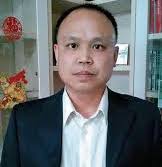
Police seized human rights lawyer Yu Wensheng (余文生) in January 2018 after he released an open letter calling for amendments to the Chinese Constitution. Judiciary officials had revoked Yu’s license to practice law three days earlier. Police initially held him in Beijing, before transferring him to Jiangsu Province and putting him under RSDL. In April, authorities formally arrested Yu on “inciting subversion” and “obstructing public duties” charges. As of writing, he is still being held incommunicado.
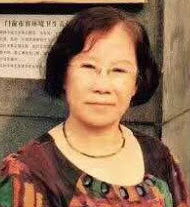
Lawyers Wang Quanzhang (see Section 1.2: Enforced Disappearance), Li Yuhan (李昱函), and Jiang Tianyong (江天勇) remained behind bars throughout the year. In October, ahead of a pre-trial meeting, Li Yuhan told her lawyers she had been mistreated at the detention center, including being deprived of medical care, forced to bathe in ice cold water in the winter, and psychological torture. After filing a complaint, guards deprived her of water and medication.
In 2018, authorities suspended, cancelled, or revoked the licences of 11 rights lawyers. The Guangdong judicial authorities disbarred lawyers Sui Muqing (隋牧青) in January. Several lawyers were formally stripped of their law licenses after being convicted as part of the 709 Crackdown, including Li Chunfu (李春富), Li Heping (李和平), Xie Yanyi (谢燕益) and Zhou Shifeng (周世锋). Also in Guangdong, authorities disbarred lawyer Liu Zhengqing (刘正清) in January 2019, after notifying him of the impending penalty in December. Authorities specified that the decision was a punishment for Liu making public his court defence statements in two cases dating back to 2016 and 2017. In handing down many of these punishments, judicial authorities also cited social media posts as “evidence” of violations under revisions made in 2016 to administrative management measures on law firms and lawyers.
Despite great risks for speaking out, many lawyers joined over 2,000 individuals in signing a joint open letter supporting lawyer Sui Muqing when the government took away his license to practice law. A dozen or so lawyers set up what they mockingly named the “Disbarred China Lawyers Club” in September. They vowed to continue providing legal consultation to victims of rights abuses and push for rule of law reform. Several of the members, including Qin Yongpei (覃永沛), Sui Muqing, Wen Donghai (文东海) and Wang Yu (王宇), had been stripped of their lawyers’ licenses in previous years and barred from representing clients in court trials or visiting them at detention centers. Authorities targeted the Club and declared it an “illegal organization” in November. Police raided one location in January 2019.
Li Wenzu (李文足), the wife of detained lawyer Wang Quanzhang, continued her resilient and resourceful campaign for justice for her husband despite repeated police obstruction and harassment. Li submitted numerous petitions to the Supreme People’s Court throughout 2018 over the violation of her husband’s rights. In December, she and three other wives of lawyers detained in the “709 Crackdown”`—Wang Qiaoling (王峭岭), wife of Li Heping (李和平), Liu Ermin (刘二敏), wife of Zhai Yanmin (翟岩民), and Yuan Shanshan (原珊珊), wife of Xie Yanyi (谢燕益)—shaved their heads in protest of the persecution of their husbands.
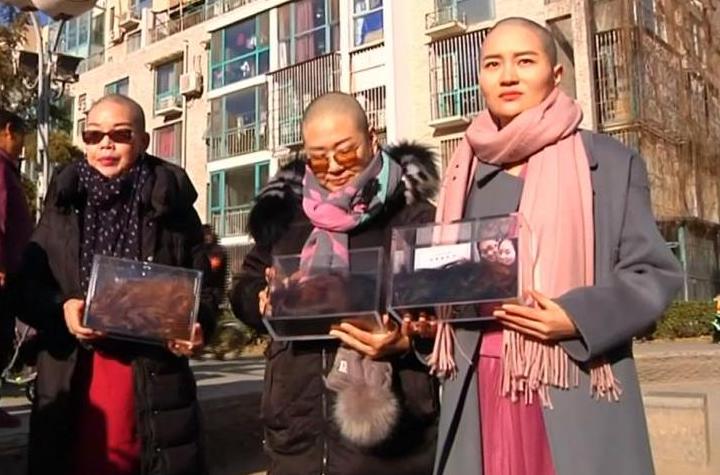
Individuals contributed to evidence gathered for a submission under the US Global Magnitsky Human Rights Act, calling on the US Government to designate for sanctions Zhao Fei, the former director of the Tianjin Public Security Bureau, for his role in the persecution of Chinese human rights lawyers. During the time that Zhao Fei headed the Tianjin PSB, from July 2014 to July 2017, he presided over the use of enforced disappearances, arbitrary detention, and torture of detained lawyers and activists. 19 cases involving serious human rights abuses can be directly linked to the Tianjin PSB under Zhao’s command.
3.2 Labor Rights Defenders
Labor rights defenders continued to suffer from harsh retaliation. Many labour organizations folded or scaled back operations in 2018.
In July and August, Guangdong police detained a number of labor organizers and factory workers, who went on strike at a Jasic Technology factory in Shenzhen. State media portrayed the strike as orchestrated by a “foreign funded” NGO.
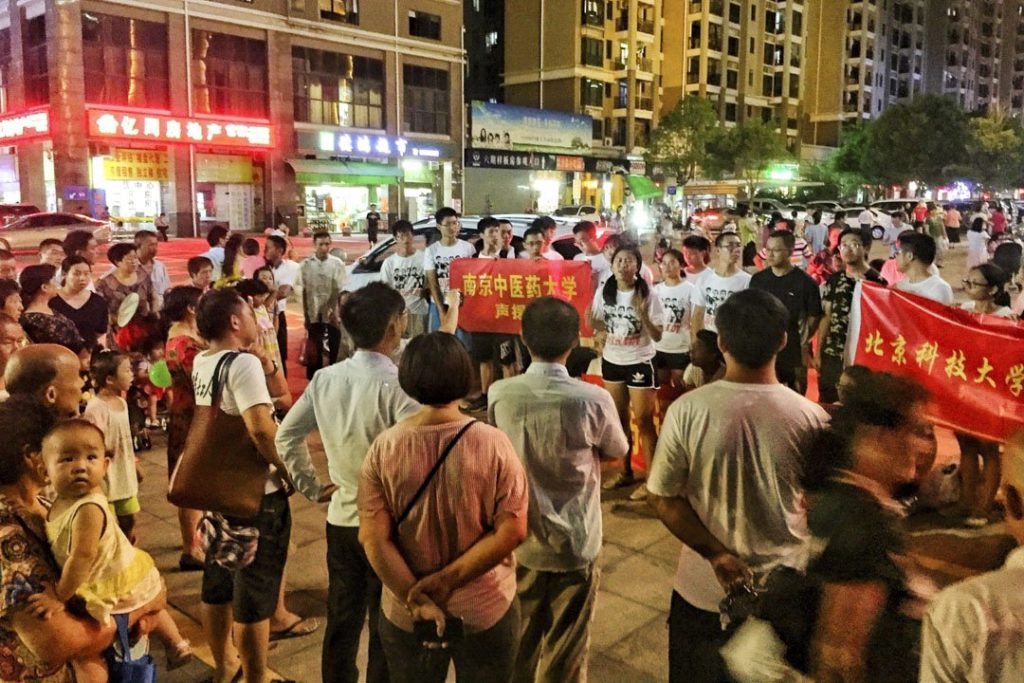
Remarkably, many students from elite universities organized and travelled to Shenzhen to support the Jasic workers’ strike. The government retaliated against the students. By September, 14 students/graduates, activists, and workers were in police custody, including four workers that had been formally arrested. These arrests outraged students on college campuses. They organized public forums and online campaigns to show their support and denounce the persecution. In November, police kidnapped and put in secret detention 12 more students. The Twitter account @jasicworkers appeared to fall silent in November. Peking University’s Party secretary claimed there had been an “illegal organization” that infiltrated the university and “incited subversion of state power.” Detentions and suppression of the students/graduates continued into January 2019.
In November, over 700 migrant workers tried to lodge their grievances with the government and staged protests over a lack of compensation and medical care for occupational diseases. The migrant workers had become ill with pneumoconiosis, a lung disease caused by inhaling dust, from working in a factory in Shenzhen. Police broke up the protests and detained a number of workers. Workers affected by the occupational disease organized protests or petitioned the government in other parts of the country.
Labour activists and some academics spoke out in support of these workers’ demands. Rights groups in the country followed the protests and monitored police reactions. One NGO estimates that roughly six million Chinese workers, mostly migrant laborers from rural villages, have been fired from their jobs with little compensation after they got sick with pneumoconiosis. These workers could no longer work and most could not afford treatment for the incurable disease. Many languished in poor health and extreme poverty.
3.3 Women’s Rights and LGBTQ Defenders
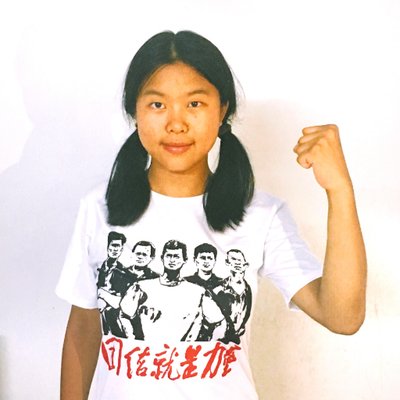
The #MeToo movement (#我也是), sparked a conversation, mainly online, about sexual harassment in China but also led to a backlash and repression from authorities and widespread censorship. Some feminists used the homonym #米兔 (mi tu) to circumvent the online censorship. Authorities shut down the Sina Weibo and Tencent WeChat accounts of the group “Feminist Voices” in March. University officials and police questioned student activists like Deng Yuhao (邓宇昊) and Yue Xin after they spoke publicly about a rape case covered up from years ago. At the time of writing, Yue remains missing, believed to be detained, for her participation in the campaign to support worker’s rights (See Section 3.2: Labor Rights Defenders).
In 2018, several women HRDs spoke out, accusing the police of subjecting them to degrading treatment by forcing them to undergo strip searches and other abuses to intimidate them. After police detained human rights lawyer Yu Wensheng in January 2018, they summoned his wife Xu Yan (许燕) for questioning in an effort to stop her from speaking out about her husband. While a female officer conducted the unnecessary strip search, male officers were nearby videotaping her.
In October, lawyer Sun Shihua (孙世华), while visiting a client at a police station in Guangzhou, was detained, strip searched, and beaten. When she filed a complaint, police denied any wrong doings, detained several eyewitnesses, and threatened her with further retaliation if she continued to seek accountability.
In another case, Fuzhou activist Zhang Lifang (张丽芳) filed a lawsuit after police strip searched and detained her for seven hours in 2017 after police stopped her at a subway station because her name popped up on a travel ban “blacklist” on the handheld devices of the police checking passengers at the station.
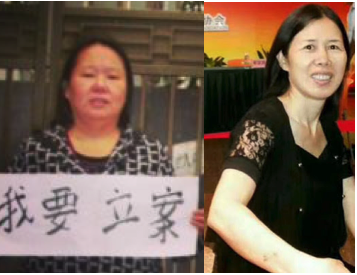
Two women human rights defenders were recognised for their work in 2018. Chen Jianfang (陈建芳) and Li Xiaoling (李小玲) received the fourth Cao Shunli Memorial Award for Human Rights Defenders in March. They were recognized for their contributions to promoting human rights at the grassroots level in China. Several human rights organizations established the award in 2014 to honor the memory, life, and human rights work of activist Cao Shunli.
LGBTQ rights activists in China pushed for equal protection and elimination of social stigma for LGBTQ individuals, including for the right for same-sex marriage. They urged the public to submit comments to a draft civil law released by the government in August. The action was led by prominent LGBT activist Sun Wenlin (孙文麟), who filed a lawsuit against authorities for rejecting his marriage application in 2016 and took other actions to push for legalizing same sex marriage.
In the first known lawsuit of its kind in China, a teacher in September sued a Shandong elementary school that fired him over his sexual orientation. In August, the school dismissed the teacher, who remains unidentified, after he posted on social media about an LGBT event that he had attended.
Tens of thousands of users successfully pressured Sina Weibo in April to drop its operation to “clean up” content related to homosexuality from the social networking platform. In objecting to the ban on homosexual content, many netizens added the hashtag #IAmGay (#我是同性恋) to Weibo messages soon after the company’s cleanup was announced. Sina Weibo’s content purge, which also included content related to pornography and violence, was apparently intended to show the company’s compliance with government restrictions on online content under China’s Cybersecurity Law.
Recommendations
For China to live up to its public pledges and international obligations to protect human rights, the government must:
- Release all detained and imprisoned human rights defenders including human rights lawyers;
- Repeal provisions in the Criminal Procedure Law, which authorizes “residential surveillance at a designated location” (RSDL) for up to 6 months without judicial review nor notifying families of the detainees’ location, and end the practice of enforced disappearance;
- Ensure prompt and impartial investigations into all allegations of torture and inhumane treatment or punishment, and hold perpetrators legally accountable;
- Ensure detainees and prisoners are promptly given access to appropriate medical treatment;
- Stop harassing and obstructing HRDs from cooperating with UN human rights operations;
- Repeal stipulations in national legislation, such as the National Security Law, Cyber-Security Law, Counter-Terrorism Law, Overseas NGO Law, National Intelligence Law, Law on Assemblies, and other relevant regulations, which abridge the rights to freedom of expression, peaceful assembly, and association;
- Guarantee religious freedom for all faith communities in China by revising portions of the Regulations on Religious Affairs and other legislation which are not compatible with international human rights standards;
- End arbitrary detention of ethnic Uyghurs and Turkic Muslims in the Xinjiang Uyghur Autonomous region, and shut down internment camps and other indoctrination programs established under “counter-terrorism” and “counter-extremism” policies;
- Guarantee the rights of lawyers, including by protecting detainee’s prompt access to legal counsel of their own choice, allowing lawyers to meet with their clients without police monitoring or interference, and investigate allegations of illegal obstruction of lawyers’ access to their clients and incidents of arbitrary detention, torture, and disappearances of lawyers.
